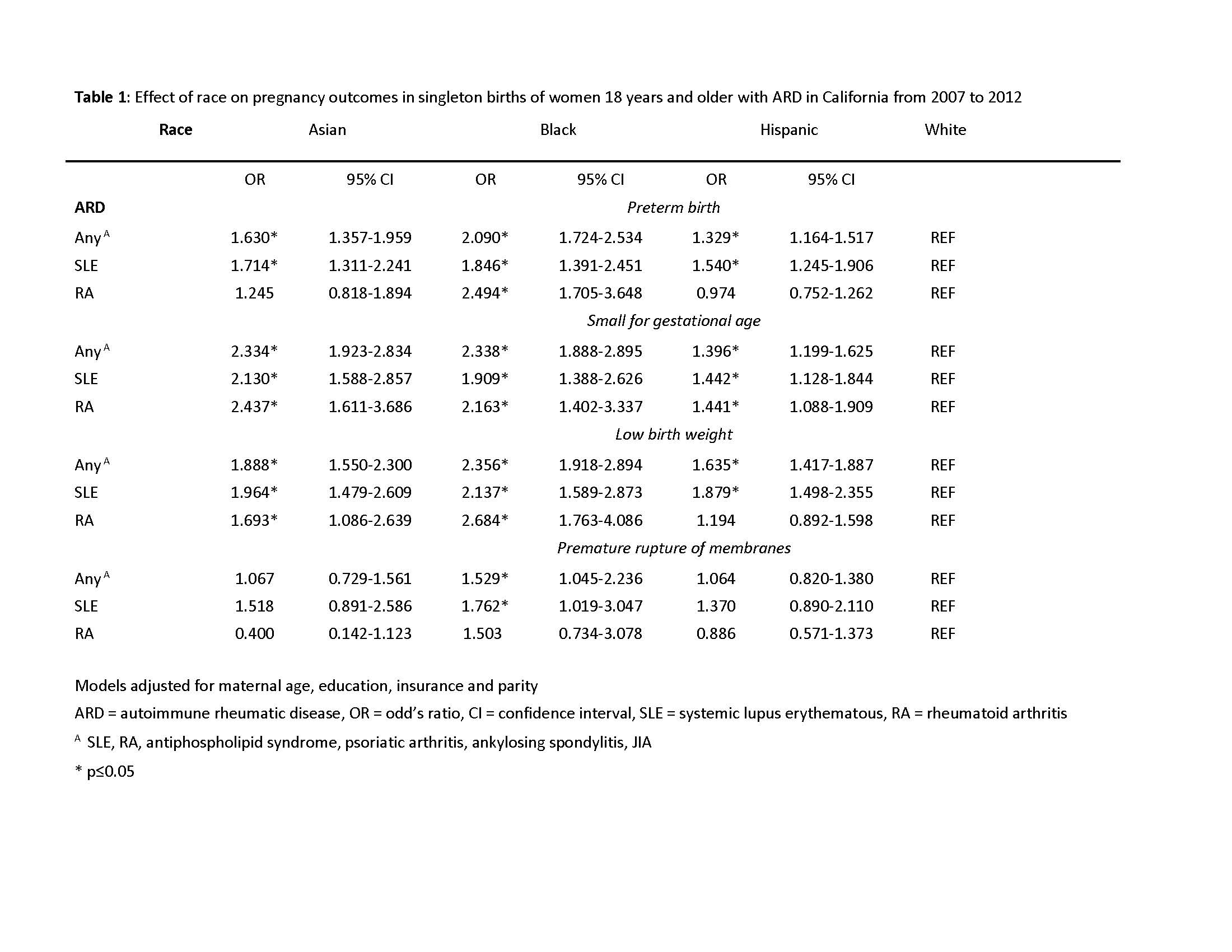Session Information
Date: Monday, November 11, 2019
Title: Epidemiology & Public Health Poster II: Spondyloarthritis & Connective Tissue Disease
Session Type: Poster Session (Monday)
Session Time: 9:00AM-11:00AM
Background/Purpose: In infants whose mothers were treated with biologic therapies during pregnancy, there has been a theoretical concern regarding potential risk of infections. Several recent reports have not noted significant increased risks for serious infections; however, there are limited data on less serious infections.
Methods: The Organization of Teratology Information Specialists MotherToBaby Pregnancy Studies recruited pregnant women in the U.S. or Canada who with or without an autoimmune condition who were or were not taking a biologic medication. Live born infants were followed by maternal interview and pediatric records to approximately one year of life. Any use in pregnancy, and gestational timing of biologic medication were examined as predictors of any non-serious infections reported by the mother or the pediatrician in the infant. Non-serious infections were defined as infections not requiring hospitalization, e.g., common cold, otitis media, influenza, or urinary tract infection. Odds ratios (OR) and adjusted odds ratios (aOR) accounting for maternal use of systemic corticosteroids and their 95% Confidence Intervals (CI) were computed using the generalized estimating equation (GEE) approach.
Results: Between 2004 and 2017, 1,513 live born infants were born to women enrolled in the study. Of these, 768 were born to mothers who had used a biologic medication anytime in pregnancy, 311 to mothers with autoimmune diseases who used no biologic medication in pregnancy, and 434 to women with no chronic health conditions. Overall, 423/768 (55.1%) of mothers who used a biologic anytime in pregnancy had an infant with at least one non-serious infection compared to 152/311 (48.9%) in the autoimmune-disease unexposed group (aOR 1.28, 95% CI 0.98, 1.68). 276/492 or 56.1% of infants born to women who used a biologic anytime in the third trimester had a non-serious infection compared to autoimmune-disease unexposed (aOR 1.32, 95% CI 0.99, 1.78). Similarly elevated but non-significant aORs were found regardless of how late in gestation the last dose of biologic medication was taken. In contrast, infants born to mothers who used biologics anytime in pregnancy were consistently more likely to have non-serious infections compared to infants born to women without autoimmune diseases (179/434 or 41.2%); ORs 1.73 to 2.32).
Conclusion: Use of biologic medications anytime during pregnancy or in the third trimester was not associated with a significant increased risk of non-serious infections in infants when compared to infants born to women with the same underlying diseases but no biologic treatment, after accounting for use of systemic steroids. In contrast, a ~2-fold increase in non-serious infections was seen with biologic use in comparison to infants born to women without autoimmune diseases. It is possible that there was bias in documentation of more mild infections in infants born to women with autoimmune diseases compared to those without. Nevertheless, these data are generally reassuring to women with autoimmune diseases who require treatment with biologics during any part or all of pregnancy.
To cite this abstract in AMA style:
Chambers C, Luo Y, Johnson D, Lyons Jones K, Xu R. Incidence of Non-serious Infections Among Live Born Infants Born to Mothers Who Used Biologic Medications During Pregnancy for the Treatment of Autoimmune Diseases [abstract]. Arthritis Rheumatol. 2019; 71 (suppl 10). https://acrabstracts.org/abstract/incidence-of-non-serious-infections-among-live-born-infants-born-to-mothers-who-used-biologic-medications-during-pregnancy-for-the-treatment-of-autoimmune-diseases/. Accessed .« Back to 2019 ACR/ARP Annual Meeting
ACR Meeting Abstracts - https://acrabstracts.org/abstract/incidence-of-non-serious-infections-among-live-born-infants-born-to-mothers-who-used-biologic-medications-during-pregnancy-for-the-treatment-of-autoimmune-diseases/

